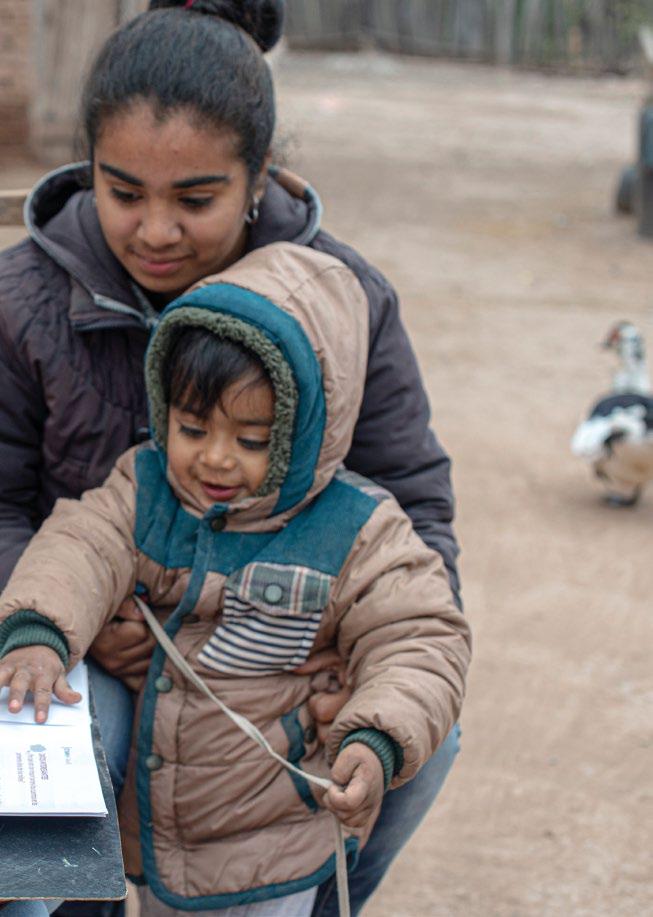
5 minute read
Good Technology
Good Technology
Generali people create new Smart Automation solutions to support the Haciendo Camino NGO, one of The Human Safety Net’s partners, which operates in Argentina where it works every day to improve the living conditions of local communities.
THE EDITORIAL OFFICE
Imagine the interior of a country with just over 46 million inhabitants in a land area of 2,791,810 km², nine times the size of Italy, where population density is very much lower than in the major cities and travel is more complicated. Argentina, with its mountain ranges, rivers, lush vegetation, and temperate climate, stretches far and wide, although this does not necessarily mean better living conditions for those who live in the interior.
According to some of the most recent data provided by INDEC (the National Institute of Statistics and Censuses of the Argentine Republic) for the second half of 2021, "in Argentina one child in two lives in poverty, 57% of families do not have adequate medical check-ups. 43% of households do not have access to clean drinking water, and 59% of mothers have their first child in adolescence." This scenario reflects a problem of distribution, particularly of the resources that sustain communities.

The vastness of the Argentine plains hides a complex reality, with the country facing socio-economic challenges that mean local communities often fail to see the benefits of progress and may even receive inadequate supplies of essential goods.
In Argentina one child in two lives in poverty
People commonly face a harsh reality of injustice and inequality, but when human solidarity meets technology a glimmer of hope emerges amid the numerous difficulties, with the Haciendo Camino story a perfect example.
CARING FOR VULNERABLE FAMILIES IN ARGENTINA
Haciendo Camino, a partner of The Human Safety Net Foundation created by Generali with the aim of unleashing the potential of people living in vulnerable circumstances, is an Argentinian non-profit organisation that supports families with young children, working in 12 isolated rural locations across the provinces of Santiago del Estero and Chaco. Its mission is to promote the development of children aged 0 to 6, offering healthcare to pregnant women, and economic and psychological support to families. Since its establishment in 2006, Haciendo Camino has worked with 3,360 young women and 13,600 families, identifying 22,793 cases of malnutrition in newborn babies. In these parts of Argentina its activities provide a vital help for rural communities that are too fragile to make their voices heard and too isolated to be noticed.
To monitor the status of each centre, Haciendo Camino and its volunteers collect data on stocks of food and essential supplies as well as on children's growth. This was previously a long and costly process, with data collection subject to delays and inaccuracies, and often took up time that could otherwise be dedicated to the families. However, data collection is crucial, especially for identifying early signs of malnutrition in children and allowing early action to be taken.
A number of experienced Smart Automation volunteers from Generali decided to accept the challenge of finding innovative digital solutions for automating Haciendo Camino's data collection procedures. Hailing from different countries within the Group, these volunteers are part of the Smart Automation Community of Practice, a Generali internal network that shares knowledge and best practices on automation with the goal of creating more efficient and effective processes.
AUTOMATION, BUT WITH A HUMAN TOUCH
Generali's experts initially identified a digital tool, UiPath, and then implemented software that provided rapid and automatic data collection and the generation of monthly reports on all the activities of the 12 Haciendo Camino centres. This collaborative effort made it easier to identify cases of child malnutrition and monitor the effectiveness of actions in the field, allowing more time and energy to be given to meeting the real needs of families. "Time spent on monthly reporting activities has now fallen by 20 hours, and is now available for providing direct support to families," said Nicolas Fiedotin, Head of International Cooperation and Alliances at Haciendo Camino.
A number of experienced Smart Automation volunteers from Generali decided to automate Haciendo Camino's data collection
Technology and automation have thus made it possible to improve the relationship between volunteers and beneficiaries, which had become increasingly difficult to maintain when tasks were performed manually with the risk of delays and inaccuracies. The collaboration between Generali people and Haciendo Camino operators demonstrates that technology does not necessarily lead to isolation but can be used to enhance human relationships, care and trust. This is a fundamental aspect of all The Human Safety Net activities and collaborations in Europe, Asia, and South America, which are directed to provide support for vulnerable families and the integration of refugees through work, with clear awareness of the foundation's mission and its identity as a global movement of people helping people.
The Human Safety Net
Created by Generali in 2017, the Foundation aims to unleash the potential of people living in vulnerable conditions, enabling them to improve the living conditions of their families and communities. Its programmes support vulnerable families with young children aged 6 or under and promote the integration of refugees through work and entrepreneurship.
More information is available at www.thehumansafetynet.org










